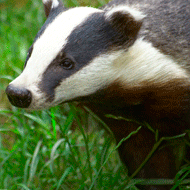
Greater bTB risk in areas with high rates of persecution, study finds
The debate on badgers and bovine TB continues as a new study led by the University of Glasgow suggests illegal badger persecution does not reduce bovine TB and may even make matters worse.
Glasgow scientists teamed up with Queen's University Belfast and the Agri-Food and Biosciences Institute, to study surveys of badger setts in Northern Ireland.
According to findings published in the journal Scientific Reports, the risk of bTB breakdowns in cattle was greater in areas of high badger social group density, with high rates of badger persecution.
Badger persecution was also found to be more common in areas with a history of high levels of bTB risk, which researchers say is indicative of 'responsive persecution' in areas where badgers are seen as a threat.
Other than the government-sanctioned culls, this is the first study that highlights the impact of badger population disturbance on maintaining the bTB epidemic, which costs the UK Government over £100 million a year.
While badgers are acknowledged to contribute to the spread of the disease, culling trials in England have thus far been criticised for failing to meet targets and provide definitive benefits.
While the reasons for this relationship have not yet been determined, researchers believe the most plausible explanations are that either persecution stimulates disease spread via the 'perturbation effect', or farmers are more likely to persecute badgers if they have had a previous TB breakdown.
Professor Rowland Kao, from the University of Glasgow, said: “We know from the randomised badger culling trial that intense culling of badgers over a small area can have an overall negative impact on cattle bTB; here, we show that badger persecution over a very broad area does not appear to reduce the risk for cattle – further it is illegal, and may even make matters worse.”
Farm-level risks - including the number of cattle movements, frequency of international imports, previous history of bTB and proximity of other farms with bTB history - were found to be a far more important factor associated with herd breakdowns than badger population density or persecution.
Researchers say farmers and stakeholders should be aware of the risks of disturbing badger setts. The findings should also be considered in the design of other bTB control programmes, such as badger vaccination, taking care to minimise the disturbance of badger social groups.
In addition, the team say their work supports previous studies that suggest control of bTB could be improved through better biosecurity and increased frequency and accuracy of cattle tests.



 The latest
The latest